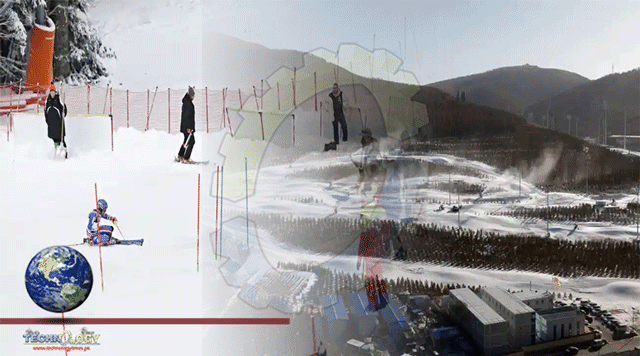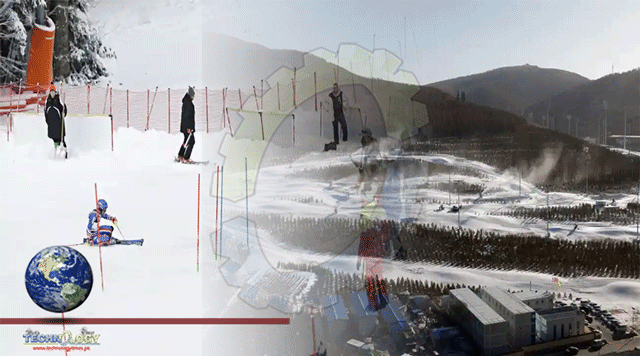Only one of 21 previous locations would be able to reliably host Olympics in future if emissions remain on current path, study shows.

Rising temperatures caused by the escalating climate crisis mean future Winter Olympics will struggle to find host cities with enough snow and ice, according to a study.
Only one of 21 previous Winter Olympics locations would be able to reliably host the Games in future if global greenhouse gas emissions remain on their current trajectory, the report says.
The findings, which come as the world’s top winter sports athletes prepare to compete on artificial snow at the Beijing Games in February, show that cities such as Vancouver, Turin and PyeongChang may become unsuitable locations for the Winter Olympics by the end of the century, with global heating leading to increasingly unsafe and unfair competition conditions.
In the Alps – home to many Winter Olympics, including the first one in 1924 – even if greenhouse gas emissions are dramatically reduced, only Albertville, at 2,100m above sea level, would remain a reliable host for the Games by mid-century, the study by the University of Waterloo found.
Researchers used a survey completed by 339 elite-level athletes and coaches to devise four climatic indicators that predict fair and safe conditions for snow sport competitions: unacceptably high or low temperatures, rain, wet snow, and poor snow coverage.
They found the frequency of unfair and unsafe conditions had increased over the past 50 years in locations where the Winter Olympics were previously held, and that this trend was likely to continue.
“No sport can escape the impacts of a changing climate. Achieving the Paris agreement targets is critical to save snow sports as we know it and ensure there are places across the world to host the Winter Olympics,” said Daniel Scott, a researcher at the University of Surrey and lead author of the study, which is published in the journal Current Issues in Tourism.
The impact of poor conditions was illustrated by the Alpine Ski World Cup in Zagreb in January. A lack of snow and high temperatures forced organisers to cancel the men’s slalom event after only 19 racers, but not before the French Olympic bronze medalist Victor Muffat-Jeandet crashed and injured his ankle.
Similarly bad conditions at the women’s slalom event were thought to provide a significant advantage to those starting first, because the condition of the course deteriorated with each competitor. Petra Vlhová, who started first, won the event, and only 22 of 60 competitors finished the race.
Temperatures at the Games have been increasing steadily – from an average of 0.4C in the 1920s-50s, to 3.1°C during the 60s-90s, and 6.3°C in the 21st century – leading host cities to take ever more drastic measures to ensure competitions can take place.
In 2010, Vancouver resorted to transporting snow by helicopter during the Games, and in 2014 in Sochi, the warmest city to host the Winter Olympics, organisers stored tonnes of snow from the previous winter for use in emergencies.
The current Winter Olympics, in Beijing, faces growing concern over its environmental impact. With the ski slopes set in an area that recorded just 2cm of snowfall between January and March last year, it will rely almost entirely on artificial snow, using an estimated 49m gallons of water.
Athletes are concerned about the impact a warming climate will have on snow sport competitions for future generations.
Lesley McKenna, the three-time Olympic snowboarder for Team GB, has seen huge changes in ski resort snowpack and glacier cover in the past 30 years. “The changes are really concerning on many levels,” she said. “The weather and snow are way less consistent now than they were at the start of my career. Plans have to be very flexible if a team is to make it to the best training locations. Everything then becomes more exclusive and more resource heavy and this doesn’t help anyone, or the climate either.”
Sören Ronge, a campaigner at Protect Our Winters Europe, said: “If no action is taken to reduce climate change, many regions will have to say goodbye to winter sports in the long run. Resorts at lower altitudes will feel this first and many have already been forced to close.” Ronge points out that many mountain communities are also dependent on summer tourism but the knock-on effects of unreliable snowfall have, in part, led to more droughts and wildfires, making summer recreation impossible too.
“Governments must prioritise reducing emissions through cleaner energy and transportation solutions, or there will be no more winter sports to celebrate at Olympic Winter Games, no more family trips to the mountains and the myriad impacts downstream as a result of the loss of reliable snowpack. Without consistent snowfall and snowpack, not being able to ski will be very the least of our problems.”
Source: The Guardian
